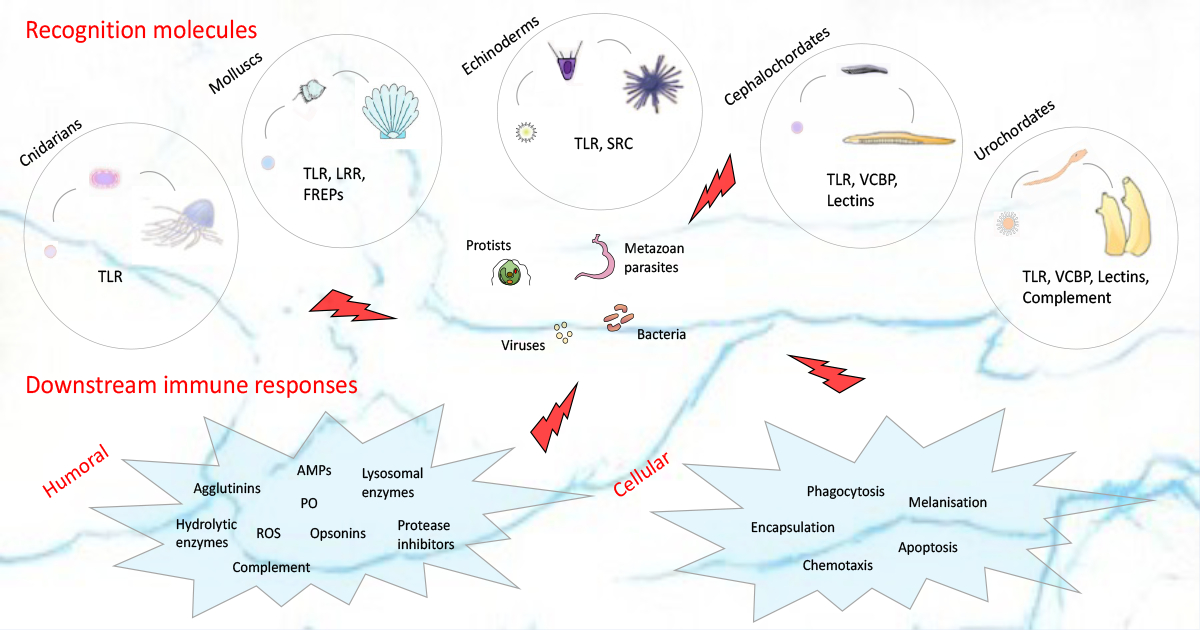Immune Competence in Marine Invertebrate Organisms throughout the Development
A special issue of Journal of Marine Science and Engineering (ISSN 2077-1312). This special issue belongs to the section "Marine Biology".
Deadline for manuscript submissions: closed (20 February 2022) | Viewed by 658

Image courtesy of Dr. Rita Marino and Dr. Daniela Melillo
Special Issue Editors
Interests: immune responses of Marine Invertebrate with a focus on Ciona robusta cellular and humoral mechanisms of defence
Special Issue Information
Dear Colleagues,
Marine invertebrate metazoans, in which immunity is independent of any demonstrated clonal recall, represent a fruitful tool for researchers to investigate the mechanisms of the innate immune response in a number of unrelated species. In fact, among the different taxa, several species have become model systems for studying phagocytosis, cellular clotting and inflammation, tissue graft rejection, reaction to Gram-negative endotoxin, immunocompetent mucus sheets secretion, and so on.
Basically, in all multicellular adult animals, the pivotal effectors of immune-surveillance are the phagocytes, known by different names (amebocytes, hemocytes, coelomocytes) in different species. These cells carry out the clearance of invading particles/microorganisms through pathogen recognition receptors and proteins (PRRs and PRPs) that recognize pathogen-associated molecular patterns (PAMPs), expressed by various pathogens. Upon receptor–ligand binding, a cascade of cellular pathways leads to release of effector molecules including cytokines, oxygen and nitrogen species, antimicrobial peptides, lectins and complement-related proteins.
Moreover, some innate immunity genes are involved in developmental processes (for example, in Ciona robusta, C3-like gene, as well as orthologous genes of C6 and C1, are transcribed during the embryonic stages) suggesting an overlapping between immune and non-immune functions or a switching from a developmental role to an immune role in the adult stages. This intriguing double function could be easily investigated in marine invertebrate species, used as models in developmental biology field.
This Special Issue aims to highlight recent evidence on the immunity during the development. Analyzing the development of immunocompetence in marine invertebrate organisms during throughout their life should clarify: (1) how the defense is carried out in an embryo in which immunocompetent tissues/organs are not yet fully developed; (2) which immune-related genes have functions both in the development and in the immunity and whether these functions overlap or switch from the embryonic to the adult stage.
Dr. Rita Marino
Dr. Daniela Melillo
Guest Editors
Manuscript Submission Information
Manuscripts should be submitted online at www.mdpi.com by registering and logging in to this website. Once you are registered, click here to go to the submission form. Manuscripts can be submitted until the deadline. All submissions that pass pre-check are peer-reviewed. Accepted papers will be published continuously in the journal (as soon as accepted) and will be listed together on the special issue website. Research articles, review articles as well as short communications are invited. For planned papers, a title and short abstract (about 100 words) can be sent to the Editorial Office for announcement on this website.
Submitted manuscripts should not have been published previously, nor be under consideration for publication elsewhere (except conference proceedings papers). All manuscripts are thoroughly refereed through a single-blind peer-review process. A guide for authors and other relevant information for submission of manuscripts is available on the Instructions for Authors page. Journal of Marine Science and Engineering is an international peer-reviewed open access monthly journal published by MDPI.
Please visit the Instructions for Authors page before submitting a manuscript. The Article Processing Charge (APC) for publication in this open access journal is 2600 CHF (Swiss Francs). Submitted papers should be well formatted and use good English. Authors may use MDPI's English editing service prior to publication or during author revisions.
Keywords
- Management of biotic and abiotic environmental load
- Immune competent tissues and organs
- Identification of pathways leading to phagocytosis, degranulation, encapsulation and melanization
- The immune response through the development
- The omics as the tool to improve the knowledge of immune system in marine invertebrates






